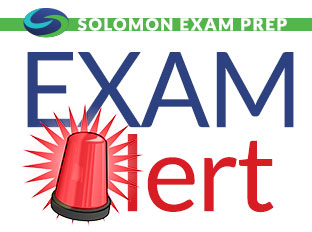This week’s study question from the Solomon Online Exam Simulator question database is now available. Relevant to the Series 6, Series 7, Series 24, Series 26, Series 62, Series 79, Series 82, and Series 99. –ANSWER POSTED– Continue reading
This week’s study question from the Solomon Online Exam Simulator question database is now available.

Question (Relevant to the Series 6, Series 7, Series 24, Series 26, Series 62, Series 79, Series 82, and Series 99):
For the question below, assume that each of the answers is solely for the benefit of the recipient and are classified as gifts, not business entertainment.
Which of the following gifts would be a violation under Rule 3220:
Answers:
A. A $20 giftcard given to a salaried employee
B. A holiday fruit basket valued at $80 paid for, or provided by, a third party vendor
C. A vase valued at $120, given as a wedding present and paid for by the employee
D. A dinner cruise valued at $120, if written consent was provided by the recipient’s employer
Correct Answer: D. A dinner cruise valued at $120, if written consent was provided by the recipient’s employer
Rationale: FINRA Rule 3220 is a broad rule with few exceptions. In the above examples, a $20 gift card given to a salaried employee would not violate the rule because it is not over the $100 limit. Regardless of the entity that pays for it, an $80 fruit basket would not violate the rule because it is not over $100. A dinner cruise valued at $120, even if written consent was provided by the recipient’s employer, is a violation because a flat $100 standard is applied, whether or not the recipient’s firm deems it appropriate. Note that in prior years, employees of NYSE firms were able to make such gifts under this scenario.
Even though it exceeds the $100 standard, a vase valued at $120, given as wedding present and paid for the by the employee is not a violation because it falls outside of the Rule 3220 restrictions. If a gift is given in commemoration of a life event (wedding, birth, etc.) and it is paid for by the individual employee, it is classified as a personal gift that is not “related to the business“ of the recipient’s employer. It is important to recognize that if the giver is ultimately reimbursed by their firm for the price of the present, the gift would be reclassified as a business-related gratuity and would then be in violation of the Rule’s $100 limitation.
Weekly study questions are from Solomon’s industry-leading Online Exam Simulator.
 Effective December 31, 2014, certain firms that are required to file FOCUS reports will be required to file an additional form called the Supplemental Inventory Schedule. On this form, firms report their gross long and short inventory positions in specified categories of securities and commodities. The requirement does not apply to firms that have (1) a minimum dollar net capital or liquid capital requirement of less than $100,000 or (2) inventory positions consisting only of money market mutual funds.
Effective December 31, 2014, certain firms that are required to file FOCUS reports will be required to file an additional form called the Supplemental Inventory Schedule. On this form, firms report their gross long and short inventory positions in specified categories of securities and commodities. The requirement does not apply to firms that have (1) a minimum dollar net capital or liquid capital requirement of less than $100,000 or (2) inventory positions consisting only of money market mutual funds.

